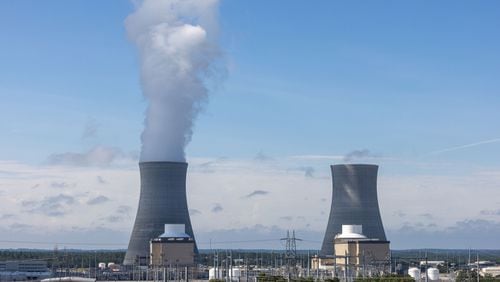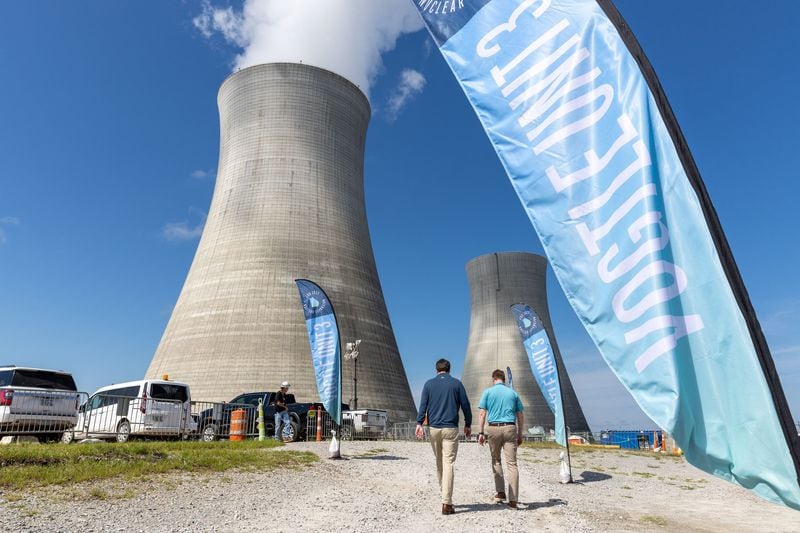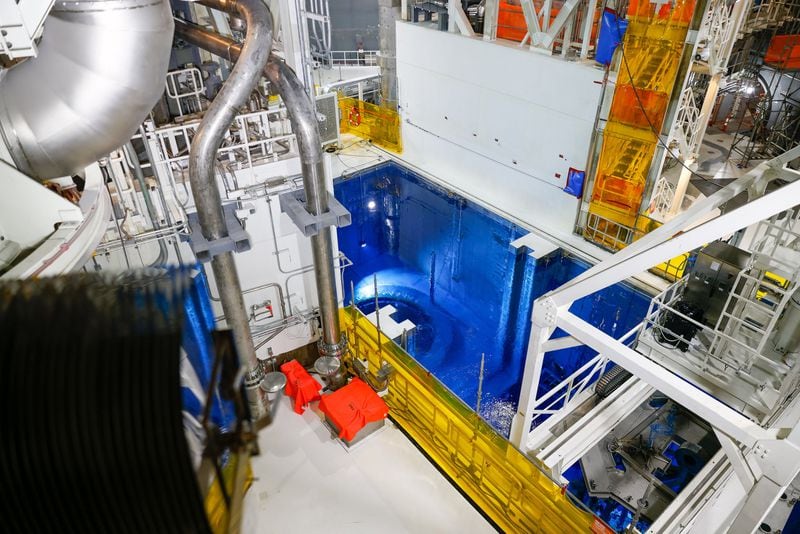The second new nuclear unit at Plant Vogtle has entered commercial service, Georgia Power announced Monday, marking the end of the expansion of the nuclear power plant near Augusta, beset by years of delays and cost overruns.
The new Vogtle units are the first new commercial reactors built from scratch in the U.S. in more than three decades.
With the second unit now online, known as Unit 4, the two reactors combined will produce enough electricity to power 1 million homes, without adding heat-trapping carbon pollution to the atmosphere. The first new unit, Unit 3, has been in service since last July, joining the original two Vogtle reactors, which have been producing electricity since the late 1980s.
The addition of the two new units makes Plant Vogtle the country’s largest generator of carbon-free electricity, Georgia Power says.
Both new Vogtle units were dogged by construction quality issues and other problems, and ultimately reached completion roughly seven years later than initially forecast. Their total price tag also blew past the original cost estimate of $14 billion to around $35 billion. Most of Georgia Power’s portion of those costs have — and will continue to — come out of the pockets of Georgia Power customers.
Credit: TNS
Credit: TNS
In a statement, Georgia Power president and CEO Kim Greene praised the unit’s co-owners and regulators at the Georgia Public Service Commission, who greenlit the project and repeatedly voted to continue construction, despite skyrocketing costs. Georgia Power owns the largest share in the Vogtle expansion with 45.7%, followed by Oglethorpe Power (30%), the Municipal Electric Authority of Georgia (22.7%) and Dalton Utilities (1.6%).
“The new Vogtle units are a key piece of our strategy to meet the energy needs of our customers not only tomorrow, but 20 years from now,” Greene said.
Oglethorpe Power’s president and CEO Mike Smith called the project’s completion the “culmination of a remarkable journey” in a statement. Oglethorpe and their partners serve 38 not-for-profit electric membership corporations who provide electricity to more than 4.4 million Georgians.
“We celebrate not only the completion of this important emission-free resource but also the historic achievement it represents as the first advanced commercial nuclear project in the nation in more than three decades,” Smith said.
Though the units will provide around-the-clock clean energy, critics have said the project’s exorbitant costs borne by Georgia Power ratepayers outweigh the environmental benefits. Some have argued the carbon-free energy Vogtle will provide could have supplied by a combination of solar and battery storage systems. Others, including staff for the PSC, have testified that the units will not provide any economic benefit to ratepayers, arguing customers would have been better served if natural gas plants had been built instead.
Credit: TNS
Credit: TNS
Even before the first new unit produced any electricity, the average Georgia Power residential customer had already paid about $1,000 over the last decade-plus in monthly bill fees to cover the project’s financing.
Late last year, state regulators voted to approve a deal to pass $7.56 billion of Vogtle’s construction costs on to the company’s ratepayers. Georgia Power and shareholders of its parent, Southern Company, will absorb the remaining $2.63 billion of the project’s construction costs.
As a result, the average residential customer using 1,000 kilowatt-hours of electricity a month will see a cumulative increase of $14.38 in their monthly bills. Part of that increase — about $5.42 — kicked in last year after Unit 3 entered service.
Now that Unit 4 is online, the rest — about $9 — will show up on customer bills starting in May.
With the new units completed, the expanded Vogtle plant will support 800 permanent jobs. At its peak, the reactors’ construction brought 9,000 workers to rural Waynesboro, 30 miles south of Augusta.
Georgia Power, the federal government and the nuclear industry had hoped the completion of the Vogtle reactors and their newly-trained workforce would provide momentum for nuclear power in the U.S.
So far, that has not happened.
There are no other commercial nuclear plants under construction in the U.S., or any signed orders to build new ones. Last fall, a much-hyped plan to build small modular reactors (SMRs) — a scaled-down version of the Vogtle reactors — was cancelled in Idaho.
Still, as energy-hungry data centers proliferate and electricity demands grow, many experts consider nuclear expansion a vital tool for fighting climate change and building American energy independence.
In an interview Monday, Georgia Power’s CEO Kim Greene left the door open to the possibility the company could seek to add even more nuclear to its own system in the future. Georgia Power will submit its next long-range energy plan to the PSC early next year, and Greene said the company is still weighing its options.
“We are going to consider all the options and look at the best long-term needs for our state and our customers,” Greene said.
A note of disclosure
This coverage is supported by a partnership with Green South Foundation and Journalism Funding Partners. You can learn more and support our climate reporting by donating at ajc.com/donate/climate/









